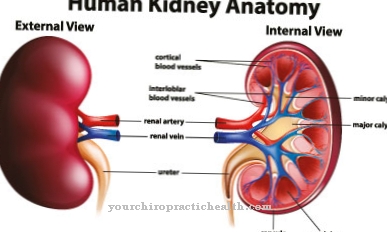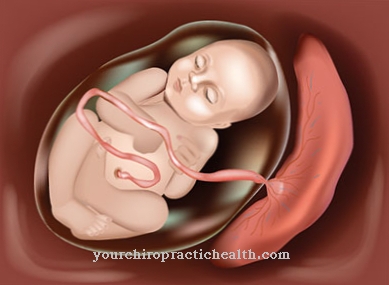A Hypophosphatemia indicates a lack of phosphate in the blood. It is very rare in industrialized countries and never occurs in healthy people with a balanced diet. Hypophosphatemia almost always occurs as a result of severe illness or malnutrition.
What is hypophosphatemia?

© Photographee.eu - stock.adobe.com
At a Hypophosphatemia it is a condition in which the phosphate concentration in the blood has dropped below 0.8 millimoles per liter. The result is a mineral metabolism disorder and a reduction in the energy supply in the cells. Such a drastic reduction in the phosphate concentration is not possible under normal circumstances. The reasons are almost always serious illnesses or malnutrition or malnutrition.
Hypophosphatemia often develops as an additional symptom of an underlying condition. In the case of malnutrition or malnutrition, it is one of several sequelae. Hypophosphataemia occurs very rarely in the general population. Healthy people are never phosphate deficient. According to previous experience, it occurs in around three percent of hospital patients, up to 30 percent in alcoholics and up to 20 percent in chronic obstructive pulmonary diseases. In addition, up to 80 percent of people with blood poisoning or serious injuries can develop hypophosphatemia.
causes
Possible causes of hypophosphatemia include malnutrition, alcoholism, artificial nutrition without added phosphate, vitamin D deficiency, chronic obstructive pulmonary diseases or acid-binding drugs (antacids). Since the body has a high buffer capacity for phosphates, a phosphate deficiency is difficult to achieve. If the intake of phosphates is reduced, the bones serve as a source of phosphate.
In the process, they are increasingly broken down, so that osteoporosis can occur. In industrialized countries, malnutrition in the body is mainly caused by anorexia nervosa (anorexia). In addition to other nutrients, phosphates are also missing here. Diseases that are associated with malabsorption of nutrients in the intestine can also lead to an insufficient supply of phosphates. These include diseases such as celiac disease or Krohn's disease.
Since phosphates develop a low pH value, acid-binding drugs also bind phosphates at the same time, which the body then loses. As part of a chronic obstructive pulmonary disease, there is increased exhalation of carbonic acid (carbon dioxide). The increasing basicity in turn binds phosphates, so that this disease can also lead to phosphate deficiency. With alcoholism, the body is no longer adequately supplied with nutrients and phosphates.
Hypophosphataemia can also result with an increased loss of phosphates. In the case of kidney diseases or drugs that promote urine, more phosphates are flushed out of the body. Vitamin D deficiency or increased production of parathyroid hormone also causes the loss of phosphates.
Symptoms, ailments & signs
Hypophosphatemia reduces the production of energy in the body's cells. Phosphates are necessary for the formation of the important energy store ATP. If this can no longer be produced in sufficient concentration, energy production will also decrease. This lack of energy leads to fatigue, weakness and heart failure. Weight loss, nausea, and vomiting also occur. Cardiac arrhythmias and breathing difficulties are also frequently observed.
For a long time a phosphate deficiency can be without symptoms. In mild cases, the phosphate mobilized from the bone is enough to keep its concentration in the blood constant. The typical symptoms only appear in the event of a major phosphate deficiency. In the long term, the increased bone loss can make the bones brittle. Affected children suffer from deformed bones and short stature. This condition often occurs with a vitamin D deficiency and is known as rickets.
Artificial nutrition as part of anorexia nervosa can lead to the so-called refeeding syndrome, which is often life-threatening. The energy requirement of the body's cells and, at the same time, the phosphate requirement increases significantly. The previous lack of phosphate intake leads to dangerous hypophosphataemia and disturbance of the electrolyte balance with cardiac arrhythmias, edema, tremors and even heart failure. If the phosphate level falls below 0.3 mmol / l, hemolysis occurs and muscle cells are destroyed.
Diagnosis & course of disease
If suspected, hypophosphatemia can be confirmed by a blood test for phosphates. Typical symptoms can confirm the suspected diagnosis of phosphate deficiency in the context of the anamnesis. The phosphate level should also be determined, especially in connection with malnutrition, malnutrition, malabsorption diseases of the intestine, COPD, alcoholism or kidney diseases.
Complications
In most cases, hypophosphatemia occurs when there is malnutrition or the patient is seriously ill. Consequently, the underlying disease must always be treated. This can also lead to various complications. However, the lack of phosphate also has a negative effect on the patient's health.
This leads to a general feeling of illness and severe fatigue. The affected person also suffers from heart problems and breathing difficulties. It can also lead to sudden cardiac death or gasping. The life expectancy of the patient is greatly reduced by the untreated hypophosphataemia. If hypophosphataemia occurs in children, it can lead to short stature or other disorders of the patient's physical and psychological development.
Failure can also occur here. Complications can arise if the phosphate is overdosed during treatment, which can damage the kidneys in particular. Those affected who change their diet during treatment often have fewer complications to struggle with. The symptoms then disappear within a few days.
When should you go to the doctor?
If fatigue, weakness, and other typical symptoms of hypophosphatemia are noticed, seek medical advice. People who suddenly lose weight or who have recurrent nausea and vomiting for no apparent cause should also speak to their family doctor quickly.In the case of serious complications such as cardiac arrhythmias or circulatory problems, it is best to consult a doctor on the same day. This is especially necessary when the feeling of illness increases rapidly in intensity or there is a risk of falling.
In the event of serious circulatory problems, those affected should call the emergency doctor. At the same time, first aid measures must be provided. The emergency services must also be alerted immediately in the event of heart failure or circulatory collapse. Further treatment is carried out by the family doctor or an internist. People suffering from malnutrition, alcohol addiction and other diseases that may cause a phosphate deficiency are particularly prone to developing hypophosphataemia and should definitely see a doctor if they have the symptoms mentioned.
Doctors & therapists in your area
Therapy & Treatment
Treatment for hypophosphatemia depends on the underlying disease or disorder. If you have a slight phosphate deficiency, it is sufficient to change your diet to include foods that are higher in phosphate. This is usually achieved through increased consumption of milk and dairy products. In many cases, the phosphate deficiency is compensated for. In the case of greater deficits in phosphate, sodium or potassium phosphate can also be administered.
Intensive care patients are often given intravenous solutions containing phosphate. However, care must be taken that phosphate is not overdosed. Overdose results in kidney failure, hypocalcemia, dropping blood pressure and heart problems. However, it is very important to treat the underlying disease or to end the deficiency state with a balanced diet.
prevention
Hypophosphataemia can be prevented by eating a healthy and balanced diet. However, it should be noted that it is very difficult to cause a phosphate deficiency by a wrong lifestyle. The way of life must be so extreme that it is already considered a disease such as anorexia nervosa or alcoholism. Here it is important to deal with deeper problems psychotherapeutically. Other causal diseases also require intensive treatment.
Aftercare
Depending on the severity of the hypophosphatemia, drug follow-up treatment or a change in diet may be required. A slight phosphate deficiency can be prevented by consuming foods rich in phosphate, such as dairy products. If the deficit is greater, dietary supplements containing sodium phosphate or potassium phosphate are available.
By changing your diet, it is quite easy to avoid the previous problems. Those affected receive the relevant information from their doctor, pharmacist or professional nutritionist. Care must be taken that the patients do not ingest too much phosphate.
Basically, it helps to focus on a balanced diet during aftercare. Good introspection is definitely useful. In this context, those affected should inform themselves comprehensively about the signs and causes of a phosphate deficiency. Sometimes there are psychological triggers for the illness that are more difficult to identify.
Especially in the phase after the initial treatment, such deeper reasons can come to the surface. Psychotherapy may be recommended to successfully combat physical symptoms through comprehensive follow-up care. The corresponding work-up has a positive effect on the body feeling and the overall quality of life of those affected.
You can do that yourself
The possibilities for self-help are relatively limited when it comes to the symptoms of hypophosphataemia. However, if the disease occurs as a result of malnutrition, the diet must be changed. Fish and nuts are particularly suitable for eliminating the phosphate deficiency.
As a general rule, as soon as those affected are properly nourished, there is rapid improvement and the deficiency can be remedied. Friends can also help with the creation of a nutrition plan, although the use of a nutritionist is advisable in serious cases. The person affected can also take food supplements from the pharmacy to counteract the deficiency. The consumption of dairy products also has a very positive effect on the course of the disease.
Furthermore, the person concerned should note that the amount of phosphate should not be exceeded. This is especially important when taking supplements. In case of doubt, a doctor should always be consulted.
Since hypophosphataemia leads to heart problems and muscle weakness, the person affected should take it easy and not engage in any sporting or strenuous activities. If you have severe eating disorders, talking to your parents or friends often helps. However, discussions with other affected persons can also prove to be useful.


.jpg)



.jpg)




















